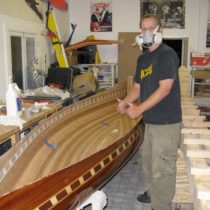Landscape Architecture for Landscape Architects › Forums › GENERAL DISCUSSION › Short interview….big topic; “Have we designed our way to disaster?”
- This topic has 1 reply, 3 voices, and was last updated 15 years, 4 months ago by
 Boilerplater.
Boilerplater.
-
AuthorPosts
-
November 1, 2010 at 6:04 pm #167117
Tanya Olson
Participanthttp://www.minnpost.com/steveberg/2010/10/25/22660
I’ll be interested to hear what you all think. I wish the interview was longer! What if we are talking about the wrong thing – or the right thing in the wrong way. Efficiency coupled with redundancies? Hmmm. No more monocultural thinking? How many times do we have to learn that?
November 1, 2010 at 8:01 pm #167122 BoilerplaterParticipant
BoilerplaterParticipantHave you read “Collapse” by Jared Diamond? The case studies he presents show that “hubris” as a societal phenomenon is hardly a post WWII phenomeonon.
Yes, design needs more of this kind of thinking, but its just too much to grasp for most people. Try talking to your clients about the complex systems that their project is tied into, and they’ll probably tell you they’re paying you for a planting plan that will get their project approved.
November 1, 2010 at 8:21 pm #167121Tanya Olson
ParticipantYeah – we have a problem with scale. Its hard to intergrate this kind of thinking into everyday life. I think thats actually what he’s saying – that to not design our way into disaster we have think systemically and specifically simultaneously (what a mouthful!) which is a challenge for the most adept multitasker. Really – most people struggle just to work and feed themselves. We’re trapped in a viral system (of thinking, behavior, etc etc) that perpetuates itself; reproduces copies of itself that are integrated into every aspect of life. It might take a while for this kind of thinking to spread and get integrated – a critical mass issue probably.
I haven’t read Collapse. Its been sitting there on the shelf looking at me for a couple of years now….maybe this will get me to finally read it!
November 1, 2010 at 8:43 pm #167120 Ben YahrParticipant
Ben YahrParticipantNice little article, and much easier to get through than “Collapse”…
The readers also had some good points, especially about streetcars.
One point that wasn’t very clear was the difference between complexity and diversity. It would be better to address many of these issues by enabling a variety of choices and options rather than designing complex systems or technological fixes. Zoning could be an example: relaxed codes could outwardly result in a similar solution to a complex new urbanist or t.n.d. design, but it would be more robust through ‘natural selection’.
November 1, 2010 at 10:20 pm #167119Tanya Olson
ParticipantReally great point. Your comment made me think about planting trees in urban areas where they need synthetically supported root zones and engineered soil to even grow. Adaptation to tough conditions or an ever-shrinking niche?
November 2, 2010 at 2:49 am #167118 BoilerplaterParticipant
BoilerplaterParticipantI thought Collapse was great. He’s a good writer. Kept me interested through the whole thing, and not many books of that size have had such an effect. Diamond has been criticized for collecting information to support his theses, much as Mike Davis has, but he still makes a powerful argument. I went to a lecture by an anthropologist that attempted to refute his arguments and portray the idea that indigenous people were capable of ruining their environment as racist, but it came across as weak to me.
-
AuthorPosts
- You must be logged in to reply to this topic.


